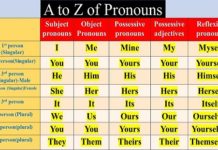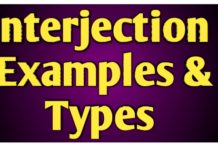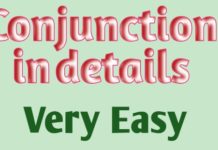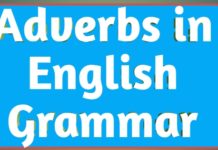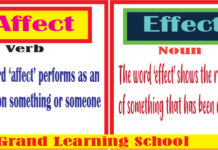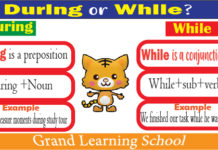clause definition: Clause is a group of word which have a subject and verb word and works as a part of complex and compound sentence.
clause definition (বাক্যাংশ) : clause হল বাক্যাংশ। এই বাক্যাংশের মধ্যে যদি একটি সাবজেক্ট (subject) ও একটি সমাপিকা ক্রিয়া (finite verb) থাকে এবং এটা যখন একটি পূর্নাঙ্গ বাক্যের অংশ হিসাবে কাজ করে ,তখন তাকে Clause বলে।
Example- When the boy was dancing in the concert ,we were watching this dance.
There are two clause in this sentence, “When the boy was dancing in the concert” and “we were watching this dance” both of each parts of sentence have a subject and object .
এই বাক্যটিতে (sentence) দুটি clause আছে, “When the boy was dancing in the concert” এবং “we were watching this dance” প্রতিটিরই একটি subject (উদ্দেশ্য) এবং একটি object আছে ।
A clause is a group of related words has a subject and verb. An independent clause, along with having a subject and verb, expresses a complete thought and can stand alone as a coherent sentence.
In contrast, a subordinate or dependent clause does not express a complete thought and therefore is not a sentence.
classification of clause clause এর প্রকারভেদ
Mainly clause are 3 types:
- Principal clause or independent clause
- Subordinate clause or dependent clause
- Co-ordinate clause
Principal clause or independent clause: The clause which doesn’t depend on other clause to express its meaning,yet it can express it’s meaning independently.
(যে clause তার অর্থ প্রকাশের জন্য অন্য clause এর উপর নির্ভর করে না বরং নিজেই স্বয়ং সম্পূর্ন ভাবে নিজের অর্থ প্রকাশ করে তাকে principal clause বা independent clause বা main clause বলে )
I saw her, she was dancing. Fernando left, and Erica brushed her long, black hair.
Here both sentence are independent and they can express its meaning independently. All independent clause of a sentences are joined by using coordinating conjunctions ( and, but, for, nor, or, so, and yet) or by using semicolons.
একাধিক Independent clause বা main clause and, but, for, nor, or, so, yet or by semicolons দ্বারা যুক্ত থাকে।
Subordinate clause or dependent clause যে সব clause নিজে নিজে অর্থ প্রকাশ করতে পারে না,অর্থ প্রকাশের জন্য তাকে তার principal clause এর উপর নির্ভর করতে হয়, তাকে Subordinate clause or dependent clause বলে।
Subordinate clause সাধারণত Subordinating conjuction দিয়ে শুরু হয়। যেমন- When,while,before,after,that,till,until,who,which,whom,since,though,although,if ,unless etc.
Ratan said that he was well.
Here – “that he was well” is a dependent or subordinate clause.
Subordinate clauses
A subordinate clause has a subject and verb but, unlike an independent clause, cannot stand by itself. It depends on something else in the sentence to express a complete thought, which is why it’s also called a dependent clause. Some subordinate clauses are introduced by relative pronouns ( who, whom, that, which, what, whose) and some by subordinating conjunctions ( although, because, if, unless, when, etc.). Subordinate clauses function in sentences as adjectives, nouns, and adverbs.
Dependent clause is divided into three types:
- Noun clause
- Adjective clause or relative clause
- Adverb clause
Noun clause: কোন clause যদি noun এর কাজ করে তবে তাকে noun clause বলে। Noun clause এর আগে সাধারণত that ,what ,how, why ,whether দ্বারা শুরু হয়ে থাকে।
যে clause একটি sentence এ যেকোন noun এর পরিবর্তে বসে এবং subject, object বা complement হিসেবে ভূমিকা পালন করে তাকে noun clause বলে ।
A noun clause functions as a noun in a sentence.
What I want for dinner is a hamburger. (subject of the verb is)
The host told us how he escaped. (direct object of the
verb told)
A vacation is what I need most. (complement of the
linking verb is)
Give it to whoever arrives first. (object of the
preposition to)
Example:
- The book I bought yesterday was really helpful to complete my assignment. Or What I bought yesterday was really helpful to complete my assignment.
Here “What I bought yesterday” is a noun clause acting as the subject.
এখানে “What I bought yesterday” একটি noun clause যা subject হিসেবে কাজ করছে।
- I did not know that she is coming.
Here “that she is coming” is the noun clause acting as the object.
এখানে “that she is coming” একটি noun clause যা object হিসেবে কাজ করছে।
- I am sad that you are leaving tomorrow.
Here “that you are leaving tomorrow” is a noun clause acting as an adjective complement because it answers the question “why am I sad?”
এখানে “that you are leaving tomorrow” একটি noun clause যা adjective complement হিসেবে কাজ করছে কারণ এটি “আমি কেন দু:খিত” এই প্রশ্নের উত্তর দিচ্ছে ।
Adjective or Relative Clause:
The clause which describes a noun just like an adjective is called adjective or relative clause.
যে clause একটি nounকে একটি adjective এর মত বর্ণনা করে তাকে adjective বা relative clause বলে।
Adjective clauses are of two types:
i. Restrictive Clause:
The adjective clause which specifies or restricts the noun is called restrictive clause.
যে adjective clause কোন nounকে বিশেষভাবে নির্দিষ্ট করে বোঝায় তাকে restrictive clause বলে ।
Example:
- The building that they build in Dhanmondi sold for five
Here, “that they build in Dhanmondi” is a restrictive clause because it is specifying the building. It is also implied that there could be several buildings.
ii. Nonrestrictive Clause:
The adjective clause which adds extra information about an already specific noun is called nonrestrictive clause.
যে adjective clause আগে থেকে নির্দিষ্ট কোন noun সম্পর্কে বাড়তি কোন তথ্য দেয় তাকে nonrestrictive clause বলে ।
Example: clause এর সহজ নিয়ম
- The building, which they build in Dhanmondi, sold for five
Here “which they build in Dhanmondi” is a nonrestrictive clause because it is specifying the building which is already specified by a comma. It is also specified here that there is only one building to talk about.
Adverb Clause:
An adverb clause expresses where, when, how and why something occurs.
একটি adverb clause কোথায়, কখন, কিভাবে এবং কেন কোনকিছু ঘটে তা বোঝায় ।
Example:
- I will meet you when I have completed all my assigned tasks.
Here “when I have completed all my assigned tasks” is an adverb clause as it is expressing when I will meet you.
এখানে “when I have completed all my assigned tasks” একটি adverb clause কারণ এটা বোঝাচ্ছে, কখন আমি তোমার সাথে দেখা করব ।
Clause Exercise
1.I shall go where he lives. here, “where he lives ” is a —-,
a.an adverbial clause b. a noun clause c. Adjective clause d.co-ordinate clause
2.He tells a tale that sound untrue, here ‘”that tell a tale” what’s clause
a. relative b. adjective c. noun d. antecedent
3.——- surprised me.
a. What you said b. If you say so c. Because of saying so d. what did you say
4.A thing of beauty is a joy forever, here “of beauty “is
a. prepositional phrase b. adjective phrase c. noun phrase d. adverbial phrase
5.Identify the sentence with adjective clause
a. I know what he said. b. He is the boy who come here yesterday.
c. The rumor, that she died, is not true. d. She reads hard so that she can pass.
6.The book which I bought is lost, Here “which I bought ” what’s clause.
a. Noun b.co-ordinate c. adjective d. adverb
7.I took no notice of him, so he flew into rage, Here “so he flew into rage “what’s clause.
a. noun b.co-ordinate c. adjective d. adverbial
8.The question is how he will respond, here “how he Respond” is
a. noun clause b. adjective clause c. adverbial clause d.an adverb of time
9. What a pity! The man is dead, Here “what a pity” is
a. adverbial phrase b. Interjectional phrase c. conjunctional phrase. d. verbal phrase
10.We were waiting for the bus. Here “for the bus” is
a. adverbial phrase b. noun phrase c. prepositional phrase d. verbal phrase
Clause Ans: 1. A 2. B 3. C 4. B 5. B 6. C 7. B 8. A 9. A 10. A


